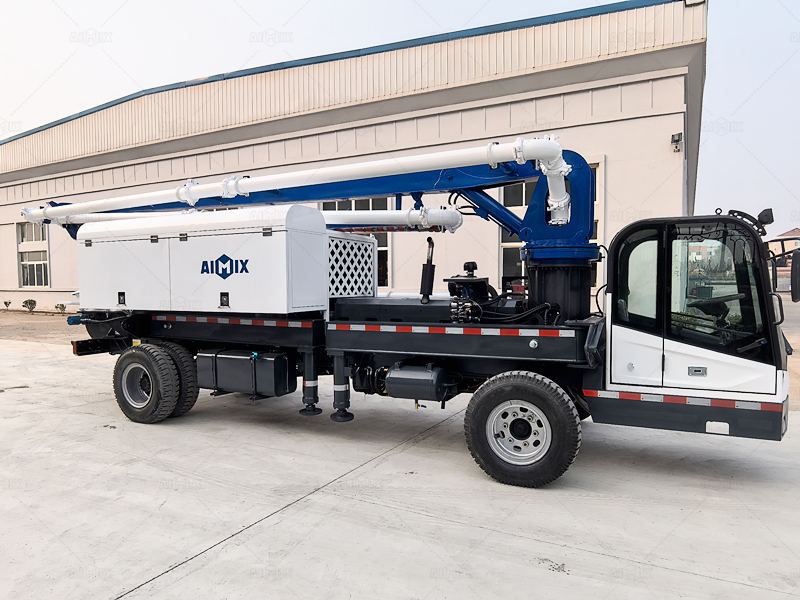How to Properly Disassemble Different Types of Concrete Pumps for Sale
- aimixglobal5
- Mar 27, 2025
- 4 min read
Whether you're preparing a concrete pump for sale for transport, performing maintenance, or decommissioning equipment, proper disassembly is crucial to prevent damage and ensure safety. This guide provides step-by-step instructions for disassembling various concrete trailer pump for sale models, including boom pumps, stationary pumps, and trailer-mounted units. We'll cover essential tools, safety precautions, and specialized techniques for different pump configurations.

Safety Precautions Before Disassembly
A. Mandatory Safety Gear
Protective Equipment:
Hard hat
Safety goggles
Heavy-duty gloves
Steel-toe boots
Workspace Setup:
Ensure a flat, stable surface
Use jack stands for support
Block pump wheels (for trailer models)
B. Pre-Disassembly Steps
1. Depressurize hydraulic systems (release all stored energy)
2. Disconnect power sources (battery, electrical lines)
3. Drain fluids:
Hydraulic oil
Residual concrete in pipelines
Engine coolant (if applicable)
Disassembling a Trailer-Mounted Concrete Pump
A. Step-by-Step Process
1. Remove the Outriggers & Stabilizers
Retract fully and secure with locking pins
Detach hydraulic hoses (label for reassembly)
2. Disconnect the Pumping System
Unbolt the hydraulic cylinders
Remove the S-tube or ball valve assembly
Extract the piston rods carefully
3. Separate the Trailer Chassis
Support the pump unit with an overhead crane
Unbolt the main frame connections
Slowly lift the pump assembly clear
4. Break Down the Hydraulic System
Drain and cap all hoses
Remove the hydraulic oil reservoir
Tag all electrical connections
*Special Note:* For models like the Schwing S500, additional steps are needed to detach the swivel-mounted boom.
B. Tools Required
| Tool | Purpose |
|------|---------|
| 50-ton crane | Lifting main pump assembly |
| Torque wrench (½" to 1") | Frame bolt removal |
| Hydraulic line crimper | Sealing disconnected hoses |
| Bearing puller | Wheel hub disassembly |
Disassembling Stationary Concrete Pumps
A. Key Differences from Trailer Pumps
No wheel/trailer components
Larger foundation mounts
Often more complex piping systems
B. Critical Disassembly Stages
1. Pipeline Removal
Start from the discharge end
Use a pipe stand to support sections
Number each segment sequentially
2. Hopper & Agitator Dismantling
Remove drive motor first
Unbolt side panels
Extract the agitator shaft carefully
3. Hydraulic Power Unit (HPU) Breakdown
Isolate and drain the oil cooler
Remove pump mounting brackets
Detach control valves systematically
*Pro Tip:* For Putzmeister BSA models, the HPU typically weighs 800-1200kg use appropriate lifting gear.
Boom Pump Disassembly Techniques
A. Special Considerations
Multi-section booms require precise sequencing
Counterweight removal must be carefully balanced
Fold the boom properly before detachment
B. Step-by-Step Boom Breakdown
1. Boom Folding Procedure
Fully retract all cylinders
Secure each joint with transport locks
Use tag lines to control movement
2. Counterweight Removal
Calculate weight distribution
Use synchronized lifting points
Store weights flat to prevent deformation
3. Boom Separation
Disconnect rotation bearing first
Remove pin connections in reverse order of assembly
Support each section during disconnection
*Warning:* A 42m boom can have over 18 critical connection points document each step with photos.
Component-Specific Disassembly Guides
A. Hydraulic Cylinder Breakdown
1. Rod End First Removal
Secure the barrel in a vise
Remove the gland nut
Extract the piston assembly
2. Seal Replacement Tips
Note orientation of wipers
Use plastic tools to prevent scoring
Clean all grooves thoroughly
B. Concrete Pump Valve Systems
| Valve Type | Disassembly Method |
|------------|--------------------|
| S-Valve | Remove wear plates first |
| Rock Valve | Extract the rock arm pivot pin |
| Ball Valve | Drain lubrication system first |
Transportation Preparation
A. Packaging Best Practices
Pump Unit:
Wrap exposed rods in VCI paper
Apply rust inhibitor to machined surfaces
Use custom wooden crates for overseas shipping
Hydraulic Components:
Seal all ports with ISO-certified caps
Pressurize cylinders to 10psi for storage
Bag small parts in labeled pouches
B. Weight Distribution Planning
| Component | Typical Weight | Handling Notes |
|-----------|---------------|----------------|
| 40m boom | 4,200kg | Requires spreader bar |
| HPU | 900kg | Lift from designated points |
| Trailer chassis | 3,500kg | Center of gravity calculation |
Common Mistakes to Avoid
1. Improper Documentation
Failure to photograph connection points
Not labeling hydraulic hoses
Losing specialty fasteners
2. Safety Oversights
Not verifying all pressure is released
Working under unsupported loads
Ignoring MSDS for fluid handling
3. Equipment Damage
Using pry bars on machined surfaces
Hammering bearing races directly
Storing components on bare concrete
Specialized Tools for Efficient Disassembly
A. Recommended Equipment List
1. Hydraulic Power Pack (for controlled cylinder retraction)
2. Laser Alignment Tools (for boom reassembly reference)
3. Magnetic Trays (for fastener organization)
4. Borescope Camera (for internal inspection)
B. Cost vs. Benefit Analysis
| Tool | Price Range | Time Savings |
|------|------------|-------------|
| Hydraulic torque wrench | $1,200-$3,000 | 2-3 hours per pump |
| Portable parts washer | $4,500 | 1 day cleaning time |
| Digital torque analyzer | $2,800 | Prevents reassembly errors |
Best Practices Summary
1. Systematic Approach: Follow manufacturer's disassembly sequence precisely
2. Documentation: Create a photo log with timestamped images
3. Special Handling: Protect all sealing surfaces and precision components
4. Tool Investment: Proper equipment pays for itself in reduced labor hours
For companies preparing concrete pumps for sale, proper disassembly preserves equipment value and ensures safe transportation. Always consult the OEM manual for model-specific requirements a Putzmeister trailer pump requires different handling than an AIMIX stationary unit. When in doubt, hire certified technicians for complex disassembly projects.
*Need professional pump decommissioning services?* Many reputable concrete trailer pump for sale suppliers offer certified dismantling teams for $150-$300/hour often more cost-effective than in-house attempts for rare or complex models.





Comments